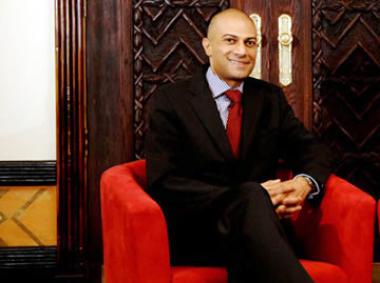SAPOA adds weight to stop Xenophobic attacks
 The property industry wishes to add its voice to those of other concerned business leaders and condemn the violence unfolding in South Africa and the rest of the African continent, says SAPOA CEO Neil Gopal.
The property industry wishes to add its voice to those of other concerned business leaders and condemn the violence unfolding in South Africa and the rest of the African continent, says SAPOA CEO Neil Gopal.
The South African Property Owners Association (SAPOA) has spoken out against the recent spate of xenophobic attacks on foreign nationals.
Africa’s second-biggest economy is facing the worst violence against immigrants since 2008. But there is a growing sense that the South African government, and president Jacob Zuma, are too late and South Africa’s reputation is already badly damaged.
In efforts curb the surge in violence, the SA Property Owners Association (SAPOA) issued a statement on Thursday, calling on the commercial property industry as well as all South Africans to take a stand against xenophobia.
In April 2015 the attacks resurfaced, resulting in a widespread outcry from the country, the African continent and the world.
After the nationwide spike in xenophobic attacks against immigrants, several foreign governments have begun to repatriating their citizens. Over the past two weeks local government and business having responded strongly.
SAPOA’s call to action adds weight to the current calls made by business leaders in the country. “We call upon all South African’s to find better ways of resolving this sensitive situation” says SAPOA Chief Executive Officer Neil Gopal.
“The property industry wishes to add its voice to those of other concerned business leaders and condemn the violence unfolding in South Africa and the rest of the African continent,” he said.
“We call upon our national and provincial leaders to come into the townships, informal settlements and city neighbourhoods that have been hit by violence. We call upon the police to work with civil society to defuse and pre-empt mob attacks against those who are helpless to defend themselves and their property,” adds Gopal.
Gopal highlights the rights granted by the Constitution to protect immigrants, refugees and asylum seekers, and raises concerns about the difficult challenge of now reintegrating the people affected by violence back into society.
Gopal is equally concerned about the effect that the xenophobic attacks will have on South African businesses in Africa. In light of the plethora of expressed outrage from around Africa, South African businesses operating in the rest of the continent may feel pressured.
South Africa relies quite heavily on Africa – according to statistics, South Africa was the biggest foreign investor in Africa in 2012 by the number of projects. Its investment in the continent has increased 536% in the past decade.
South African companies such as Shoprite, MTN, Pick n Pay, Standard Bank and Multichoice operate in many African countries and this significantly contribute towards their revenues.
“The xenophobic attacks may have a profound effect on the commercial property industry,” notes Gopal. “Thus it’s critical for the industry to address the situation immediately,” concludes Gopal.
Reveal trade secrets or…
Instead, in late January the country’s Small Business Minister Lindiwe Zulu said foreign shop owners must share their trade secrets with people in townships where they operate to curb violence and looting.
There was no pushback against Zulu, and her statement seemed to signal how sections of South African leadership remain ignorant about the rest of Africa. The foreigners who have been killed in this round of xenophobic rage are almost all Somalis and Ethiopians.
However, Somalia is still a broken country without much schooling, let alone ones where business secrets are taught. And Ethiopia remains one of the most state-controlled economies on the continent, with little room for teaching freewheeling enterprise.
Critics say that in promoting the view that immigrants have some trade secrets, officials are encouraging the harmful idea that there is a conspiracy by outsiders to take over local businesses, and disempowering South Africans by not making the point that foreigners learn trade skills through a desperate struggle to survive away from their homelands.
Inflaming violence
Fresh comments by some government ministers and public officials criticising the influx of foreign-owned shops may also be inflaming the situation, according to human rights groups.
On March 23, the Durban-based Mercury newspaper cited Zulu King Goodwill Zwelithini as saying foreigners were depriving South Africans of economic opportunities and should return home. The king’s office said his speech was misinterpreted.
Even one of president Zuma’s sons has seemed to back the attack on foreigners. On Tuesday , just days after his father had spoken out for the first time against the attack, Edward Zuma, returned to the subject for the second time in days, saying: “I am not going to stop telling the truth. The government must stop running away from addressing this issue…” he said, according to News24.
“People think that I am being xenophobic but I am not, I am just trying to make a point that we have a problem…. I am sticking to what I said and I will die with it.”
He said the attacks were evidence that the country was sitting on a ticking time bomb, and called for those in the country illegally to either leave or present themselves for documentation.
Without publicly disowning his son’s views, few foreigners are likely to take Zuma seriously.
Not surprisingly, the attacks spread. Foreign-owned shops in the Jeppestown area of Johannesburg were attacked overnight, the police said as they called for calm over fears that the attacks could trigger widespread unrest fuelled by the country’s economic troubles.
The strongest South African rejection of xenophobia, has come from outside the state. Fed up with the situation, thousands of people marched through Durban on Thursday to protest against anti-immigrant violence.
About 4,000 people marched through Durban, chanting “Down with xenophobia!” and “A United Africa” at an event attended by residents, students and local religious and political leaders.
More than 1,400 foreigners have fled their homes in Durban and nearby townships and are being housed in camps set up by the government. At least 74 people have been arrested, according to the police.
Job shortage
Earlier this year, xenophobic violence erupted in Soweto, near Johannesburg, as frustration deepens over lack of opportunities for many young blacks born since the end of apartheid in 1994.
South Africa’s economic growth was just 1.5% last year and unemployment is at around 25% —soaring to over 50% among the young.
Violence against immigrants in South Africa is common, with unemployed locals accusing foreigners of taking their jobs.
In 2008, 62 people were killed in similar violence in Johannesburg townships.
With failure to quickly end the attacks, this week strong reaction started to come from the rest of the continent, leaving South Africa with a lot of burnt bridges to repair.
Economic cost
The tension comes against the backdrop of a weakening economy and a 24% jobless rate, and could do further damage to the nation’s economy.
Investors’ perception of risk in South Africa is worsening, with credit default swaps to protect against non-payment over the next five years rising 16 basis points this week to 217. The rand gained 0.1% to 12.0485 per dollar by 9:45 a.m. in Johannesburg, taking the decline against the dollar this year to 4%.
The streets of Durban’s city centre became a battleground between locals and immigrants on April 14, with police using water cannons and rubber bullets to disperse crowds.
One of the marchers in Durban, Eric Machi, 34, said he rented rooms to Zimbabweans and Malawians until they fled from attackers in recent weeks.
“We are trying to make peace with those people who came here from Africa, but now they are gone,” he said. “It started late at night. The attackers were shouting and throwing stones, and breaking some houses.”


















